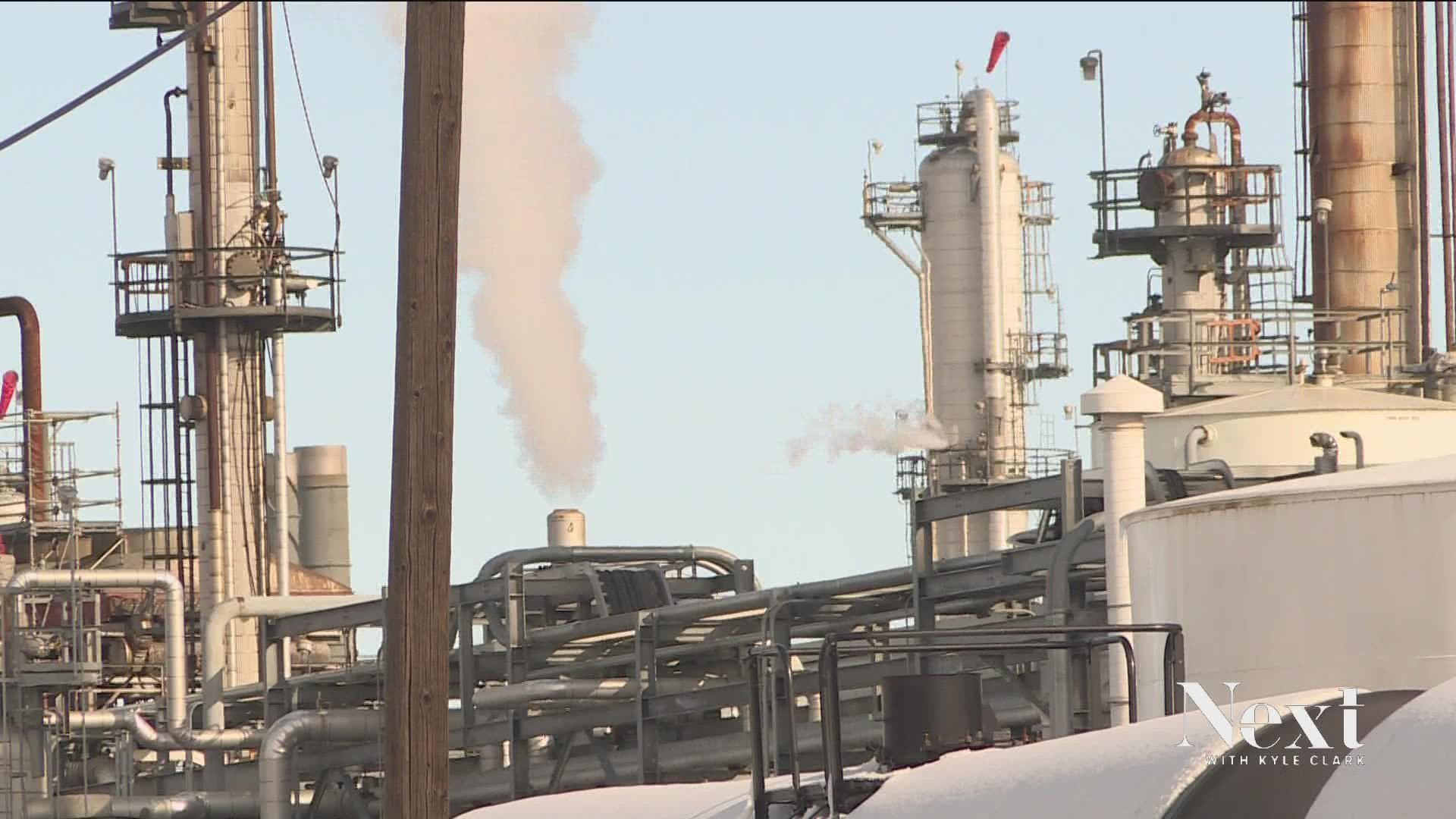DENVER — Families in north Denver and Commerce City have been saying for years that Colorado's air pollution and its rules don't do enough to protect them.
Now the Environmental Protection Agency is conducting a review to make sure the state's regulations are in compliance with federal civil rights laws.
For her entire life, Lucy Molina has lived in the shadow of Suncor.
Health issues are still plaguing her, even during an interview Friday afternoon.
"I've had a migraine since last week," she said.
"It's normal we have cancer, normal we get asthma and bloody noses and migraines," said Molina.
It's why fighting for better air quality has become all-consuming.
"It has, well yeah, this has become my life," she said.
When the EPA announced it will be doing a civil rights compliance review, especially focused on the state's permitting and air emissions regulations, Molina not only said it's long overdue but that she's wary of the results.
"So many promises that have not been fulfilled," she said, "Not only from local government at a state and federal level. I expect to start keeping their promises, to start holding polluters and corporations accountable not only for current but also past violations."
"It's not only brown, black and indigenous communities and low income communities," added Molina, "And that's this community."
"We are always interested in finding ways to improve in this work," said Trisha Oeth. She's with the Colorado Department of Public Health and Environment. Oeth said the EPA told them about this review in the spring and she welcomes it.
The state had already been reviewing and changing rules and protocols to be more equitable, including increasing monitoring for oil and gas leaks in communities disproportionately impacted by air pollution. Making sure they are breaking down their information in plain language that people can understand. And hosting meetings in multiple languages at different times of day.
During 2022, feds had also been talking with families in north Denver and surrounding areas to figure out what they should focus on in their review.
The EPA released this statement:
"On March 18, 2022, EPA's Office of External Civil Rights Compliance (OECRC) began a compliance review to ensure that the Colorado Department of Public Health and Environment's (CDPHE) methods of administering its Clean Air Act program comply with federal civil rights laws. EPA engaged with North Denver community members and other members of the public to hear their perspectives on environmental, public health, and equity issues to help inform the scope of the civil rights compliance review. After consideration of information gathered to date, the scope of OECRC's compliance review will focus on CDPHE's criteria and methods of administering its Clean Air Act Title V operating permit program and Title I minor New Source Review (NSR) program, specifically focusing on whether CDPHE's combined permit program and related approaches to regulating air emissions, comply with Title VI and EPA's implementing regulation at 40 C.F.R. Part 7.
OECRC will also review whether CDPHE has and is implementing the procedural safeguards to comply with EPA's general nondiscrimination obligations. These obligations include specific policies and procedures to ensure meaningful access to CDPHE's services, programs, and activities for individuals with limited English proficiency (LEP) and individuals with disabilities, and a public participation policy and process that is consistent, including as implemented, with the federal civil rights laws.
One of OECRC's national responsibilities is to conduct periodic compliance reviews of the programs and activities of recipients of EPA financial assistance. The initiation of a compliance review on the issues set forth above is not a decision on the merits.
EPA recognizes CDPHE's interest in and commitment to working with EPA to ensure civil rights compliance as it further develops its environmental justice program. It is our hope that, working collaboratively with CDPHE, we will reach a positive resolution in this case.
This review will be conducted in accordance with EPA OECRC's Case Resolution Manual, at: https://www.epa.gov/sites/production/files/2021-01/documents/2021.1.5_final_case_resolution_manual.pdf. The initiation of a compliance review on the issues set forth above is not a decision on the merits. Please note that EPA's nondiscrimination regulation provides that OECRC shall seek the cooperation of recipients in securing compliance with the requirements of the federal nondiscrimination statutes and EPA's implementing regulations, including through informal resolution. See 40 C.F.R. § 105."
"Title six of civil rights act is about ensuring anyone using federal funds doesn't have any programs intentionally or unintentionally implemented in a way that has a disparate impact on communities of color," explained Oeth.
Molina said what is not working for her are contradictions, watching agencies dedicate resources to fighting environmental justice and then also approve new fracking wells.
We took that that concern to CDPHE.
"We have a robust system for ensuring any operation. To operate here in Colorado it's the most protective it can be," said Oeth. "We do have more protective regulations than many states in the country."
Oeth also said the state has changed the way they are issuing permits for Suncor to be much more conscious of the community impact before giving a permit a green light.
We reached out to Suncor Friday but did not hear back.
The EPA letter that's been circulating this week, on the one hand applauded Colorado calling it a leader after passing the Environmental Justice Act .The letter also said it does periodic compliance reviews and that's a critical role in addressing historical and systemic barriers. The EPA hopes by collaborating with CDPHE, at the end of this process is will serve as a national example.
SUGGESTED VIDEOS: Full Episodes of Next with Kyle Clark

